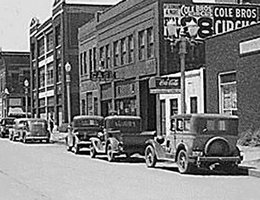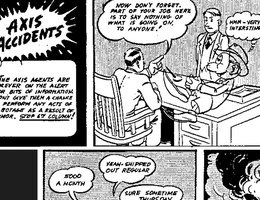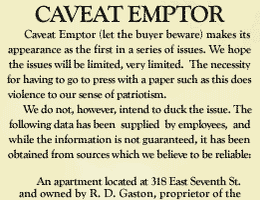

The construction of a $45 million ammunition depot (the largest in the nation) brought both growth and stress to Hastings, Nebraska. The development helped the Hastings community recover from the Depression. However, it also brought a flood of immigrants and created new social pressures. At its peak, the depot employed approximately 2,000 military personnel and 6,692 civilian production workers. There were also 2,000 civilians still involved in construction of the plant. All together, there were over 10,000 workers.

You can see signs of the growing strains by reading newspapers over the years. In 1939 before the war, Hastings celebrated their heritage during "Jubileeum Days." By all accounts, the celebration was harmonious and the people seemed united. Three years later in 1942, two newcomers sent a letter to the Hastings Daily Tribune complaining of "hostile citizens" and "town morals squads" who were herding newcomers into "concentration camps."
Concentration camps in Nebraska? What happened in three years? The Naval Ammunition Depot (NAD) happened.
The newcomers were people brought in by the U.S. Government to work at the ammunition depot. The concentration camps they referred to were the government trailer camps that housed the workers. The Naval Ammunition Depot (NAD) forced the relatively insular community of Hastings to accommodate an influx of people who brought with them diverse social and ethnic backgrounds that were quite different from the norm in Hastings.
The people of Hastings were very suspicious of the newcomers. They were unfamiliar with people of different races and backgrounds and concerned about their jobs and the rapid changes in their community. Before the boom, the black population in Hastings was less than 1% and there were very few people of other races.
Another reason for stress was the need for wartime security. Secrecy was stressed because the Navy assumed that there might be enemy spies in Hastings — even though they were so far from either coast — trying to find out how many bombs were being produced, when they might be shipped out and where they were going. The plant’s employee newspaper, the Nebraska Ordnance Plant News, stressed the importance of safety and secrecy.

It is not too surprising that many local people, who so recently had experienced the Great Depression, would react in their own self-interest when the population skyrocketed. The tremendous increase in population created a housing shortage. Rent doubled almost overnight, causing a division within the community as depot workers resented being gouged by Hastings landlords.
The Daily Tribune estimated that only abut 5 to 10% of Hastings landlords charged exorbitant rents, but the situation was severe enough that depot employees circulated a flyer headlined "Caveat Emptor" (which means "buyer beware") warning workers about rent gouging.